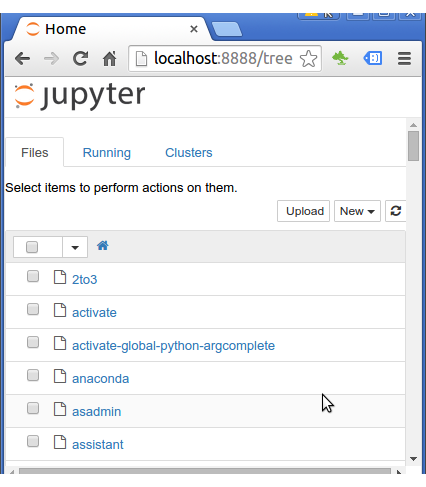
- How to install jupyter notebook in ubuntu install#
- How to install jupyter notebook in ubuntu code#
- How to install jupyter notebook in ubuntu password#
Next, we can also configure the Python environment You will have to copy/paste the login token (after …?token=) in the command line output into the login field of jupyter.
How to install jupyter notebook in ubuntu password#
or ( if you chose the second option above)Īnd copy/paste the token you see in the command line into the password field. This is the only way I can run jupyter notebook while using vagrant. This tells jupyter to listen on any IP address. You can start jupyter notebook with an extra config line of ‘–ip=0.0.0.0’.
How to install jupyter notebook in ubuntu install#
Use pip to upgrade pip to the latest version: $ sudo -H pip install -upgrade pipĪfter pgrading pip, try installing Jupyter again: $ sudo -H pip install jupyter 3. You should consider upgrading via the 'pip install -upgrade pip' command. Install Ipython and Jupyter Notebook $ sudo apt-get -y install ipython ipython-notebookĮRRORS & SOLUTIONS: Depending on what version of pip is in the Ubuntu apt-get repository, you might get the following error when trying to install Jupyter: You are using pip version 8.1.1, however version 8.1.2 is available. You can also check if pip is installed using the following command: $ pip -version 2. To verify that you have python installed: $ python -version

$ sudo apt-get -y install python2.7 python-pip python-dev Install Python 2.7 and Pipįirst login to vm with ssh: $ vagrant ssh
How to install jupyter notebook in ubuntu code#
Set up to start on reboot and launch: sudo ln -s /opt/jupyterhub/etc/systemd/rvice /etc/systemd/system/rviceĪccess the hub from a local browser pointed at in Vagrantfile make sure the forwarded ports reflect the code below (Jupyter notebook uses port 8888): config.vm.network "forwarded_port", guest: 8888, host: 8888 service, with the following content: Įnvironment="PATH=/bin:/usr/local/sbin:/usr/local/bin:/usr/sbin:/usr/bin:/opt//bin"ĮxecStart=/opt//bin/jupyterhub -f /opt//etc/jupyterhub/jupyterhub_config.py Sudo mkdir -p /opt/jupyterhub/etc/systemdĬreate file in this directory called. Set:Ĭ.JupyterHub.bind_url = ' Since this is a Pi4 keep the spawn limit low: Make sure nobody can create an account with the name root or login as root. In the generated config file replace the standard authenticator with theįirstUseAuthenticator and LocalAuthenticator to create users if necessary: c.Authenticator.admin_users = Ĭ.LocalAuthenticator.create_system_users = Trueįrom th import LocalAuthenticatorįrom firstuseauthenticator import FirstUseAuthenticatorĬlass LocalNativeAuthenticator(LocalAuthenticator, LocalAuthenticator):Ĭ.thenticator_class = LocalNativeAuthenticator Sudo /opt//bin/jupyterhub -generate-config Sudo npm install -g configurable-http-proxy Sudo /opt//bin/python3 -m pip install jupyter Sudo /opt//bin/python3 -m pip install jupyterhub-firstuseauthenticator Sudo /opt//bin/python3 -m pip install jupyterhub Sudo /opt//bin/python3 -m pip install wheel Would prefer to use NativeAuthenticator rather than FirstUseAuthenticator but templates seem to be messed up so the sign-up page does not display. Slight modifications on the instructions for a jupyter hub found here and an issue for NativeAuthenticator.

Users can only log into these accounts through the jupyterhub.This way users end up with their own account so that they do not damage each other's data.

The idea is to use this on a shared computer used for data collection through Jupyter. This sets up a hub where new local user accounts are created on first login using a combination of FirstUseAuthenticator and LocalAuthenticator.

Jonathan Gutow update: December 20, 2020Īlthough aimed at a small system on a Pi4 for multiple users, this will work on any computer with Ubuntu 20.04 lts. Notes on installing jupyter hub with jupyter notebook on RPI4 ubuntu 20.04 lts


 0 kommentar(er)
0 kommentar(er)
